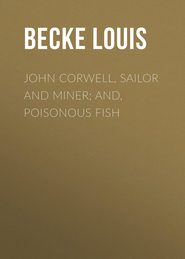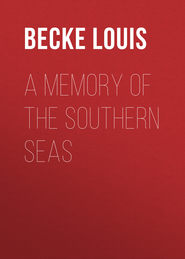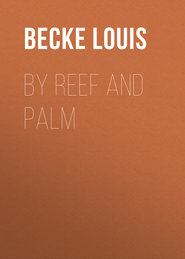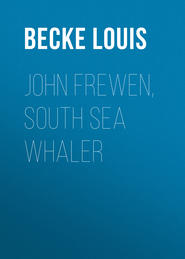По всем вопросам обращайтесь на: info@litportal.ru
(©) 2003-2024.
✖
Tessa
Настройки чтения
Размер шрифта
Высота строк
Поля
“We’ll have to run before this, Atkins,” said the mate, alluding to the approaching squall; “it will last a couple of hours or more by the look of it. Are you very wet, Miss Remington?”
“Very, Mr. Oliver,” answered the girl, with a laugh; “but I don’t mind it a bit, as the rain is not cold. I am too old a ‘sailor man’ to mind a wetting. Are you all quite well? I can’t see your face, Mr. Studdert, nor yours, Mr. Morrison, it is so dark. Oh, Mr. Studdert, I wish I had one of your cigarettes to smoke.”
“I wish I had one to give you, miss,” answered the pale-faced young engineer. “A pipe is no to my liking, but I fear me I’ll have to tackle one in the morning.”
Alas, poor Studdert, little did he know that the morning, now so near, was to be his last.
“Goodbye for the present, Miss Remington,” called out Oliver as the boats again separated. “Take good care of her, Harvey, and of yoursels too. He’ll be getting an attack of the shakes in the morning, miss, after all this wetting. Give him plenty of rum, my dear, whether he likes it or not. You’re a plucky little lady, and next to having you in my own boat I am glad to see you with Atkins. Cheer up, lads, one and all; we’ll have the sun out in another hour.”
Half an hour later both boats were driving before the fury of the squall, and the crews had to keep constantly bailing, for this time the violence of the wind was such that, despite the most careful steering of the two officers, large bodies of water came over amidships, and threatened to swamp the boats.
When dawn came the sky was again as clear as it had been on the previous morning, and Atkins stood up and looked for the captain’s and mate’s boats.
“There they are, Harvey,” and he pointed to the westward; “the skipper is under sail, and making back towards Oliver. Well, that’s one thing about him, dog as he is—he’s a thorough sailor man, and is standing back to take Oliver in tow again.”
At this time the captain’s boat was about three miles distant from that of the second mate, and Oliver’s between the two, but much nearer to Hendry and Chard’s than to Atkins’s. She was under both mainsail and jib, and as the sea was again very smooth was slipping through the water very quickly under a now steady breeze, as she stood towards the mate’s boat.
As the red sun burst from the ocean Atkins told the crew to cease pulling for a few minutes and get something to eat. The men were all in good humour, though they yet meant to wreak their vengeance on Chard and Hendry for the murder of their shipmates. The wounded man who had been put in Oliver’s boat they knew had also died, and this had still further inflamed them. But for the present they said nothing, but ate their biscuit and tinned beef in cheerful silence, after waiting for Tessa and Maoni to begin. Huka, their recognised leader, and Malua, Harvey’s servant, had both assured them that the captain and Chard would be brought to punishment, but this assurance was not satisfactory to the majority of them. One of them, the big Manhikian who had helped Latour to rescue Tessa and Maoni from their cabin, was a brother of the man who had just died from his wounds in Oliver’s boat, and he had, during the night, promised his shipmates to take his own and give them their utu (revenge) before the boats reached Ponapé.
“Turn to again, boys,” said Atkins presently, as soon as the men had satisfied their hunger; “we must catch up to the others now.”
The natives bent to their oars again, and sent the boat along at a great rate, when suddenly Harvey heard the sound of firearms. He stood up and looked ahead.
“Good God!” he cried, “look there, Atkins! The captain and Chard are firing into Oliver’s boat!”
Even as he spoke the repeated crackling of Winchester rifles could be heard, and the mate’s boat seemed to be in great confusion, and her occupants were paddling away from their assailants, who, however, were following them up closely at a distance of about fifty yards.
“Pull, men, pull! For God’s sake, lay into it! The captain and firemen are murdering Mr. Oliver and his party.”
The seamen uttered a shout of rage, and made the boat leap through the water as now, in addition to the sharp crackle of the Winchesters, they heard the heavier report of a Snider, and Harvey, jumping up on the after whaleback, and steadying himself with one hand on Atkins’s shoulder, saw that only two or three of Oliver’s crew were now paddling—the rest had been shot down.
“We’ll never get there in time, Atkins,” he cried, “unless we can hit those who are firing. It’s Chard and the skipper! Let Huka steer.”
In a few seconds the change was effected. Huka took the steer-oar, two of the after-oars were double-banked, and Atkins and Harvey sprang forward with their Sniders, and began firing at the captain’s boat, though at a range which gave them little chance of hitting her. Every moment, however, the distance was decreasing, and the two men fired steadily and carefully. But the Winchesters still cracked for another five minutes. Then the fire from the captain’s boat ceased as a shot from Atkins’s rifle smashed into her amidships. She was suddenly put before the wind, and then Chard came aft, and began firing at the approaching boat with his Snider, in the hope of disabling her, so that he and his fellow-murderer (now that their plan of utterly destroying all the occupants of both boats had been so unexpectedly frustrated) might escape.
But the work of slaughter in which he had just been engaged and the rolling of the boat, together with the continuous hum of bullets overhead, made his aim wild, and neither the second mate’s boat nor any of its people were hit, and she swept along to the rescue.
CHAPTER VIII
An exclamation of horror burst from Harvey as the boat, with its panting crew, dashed up alongside that of the chief mate.
“For God’s sake, Tessa, do not look!” he cried hoarsely.
For the half-sunken boat was a shambles, and of her nine occupants only three were alive—the second steward Jessop, Morrison, and Oliver himself. The latter lay in the stern sheets with a bullet hole through his chest, and a smashed hip; he had but just time to raise his hand in mute farewell to Harvey and Atkins, and then breathed his last.
Morrison, whose spine was broken by a Winchester bullet, but who was perfectly conscious, was at once lifted out and placed in Atkins’s boat, and Tessa, with the tears streaming down her pale face, and trying hard to restrain her sobs, pillowed his old, grey head upon Atkins’s coat. Then Jessop, who was evidently still in agony from his broken ribs, one of which, so Morrison said in a faint voice, had, he thought, been driven into his lungs, was placed beside him.
Poor Studdert and the five native seamen were dead, some of them having received as many as five or six bullet wounds. Studdert himself had been shot through the head, and lay for’ard with his pale face upturned to the sky, and his eyes closed as if in a peaceful sleep.
The boat had been pierced in several places below the water-line by Snider bullets, and by the time Morrison and Jessop had been removed, and Harvey and Atkins had satisfied themselves that the other seven men in her were dead, she was nearly full of water—not the clear, bright water of the ocean alone, but water deeply stained with the blood of the murdered men.
“We must cast off,” said Atkins in a low voice, “we can do no more.”
As he spoke a bullet from Chard’s Snider struck the water about thirty yards away, and springing up, he seized his own rifle again.
Huka placed his hand on the officer’s arm, and then turned to Harvey and spoke in Samoan, gravely and with solemn emphasis, though his brown cheeks were wetted with tears.
“Let us take no heed of the bullets that come. Here be six dead men whose souls have gone to God for judgment. Let us pray for them.”
Atkins, his blazing eyes fixed on the captain’s boat, from which every few seconds a bullet came humming overhead, or striking the water within a few yards, laid down the rifle and took off his cap.
“Go ahead, Huka. You’re a better Christian than me. Sling out a prayer for these poor chaps as quick as you can. We can’t bury them in a decent, shipshape fashion.”
Two men stepped into the sinking, shot-torn boat, and then Huka stood up amidships among his comrades, with bowed head, and his hands crossed upon his great naked chest. He prayed in Samoan.
“O Jehovah, who holdeth the great sea in the hollow of Thy hand, we commit to its depths these the bodies of our shipmates who have been slain. O Father’, most just and most merciful, let them become of Thy kingdom. Amen.”
Then, one by one, the bodies of Studdert and of the five natives were dropped overboard by the two seamen as reverently as circumstances permitted, and in silence broken only by the suppressed sobbing of the two girls.
Such stores as were in poor Oliver’s boat were next taken out, and then the wrecked and bloodstained craft was cast adrift and left to fill.
As the second mate grasped the haft of the steer-oar again another shot from the captain’s boat fell some distance ahead.
“He’s running away from us as fast as he can,” said Harvey; “look, he’s hauled up a couple of points!”
“Ay, so he has. And our short Sniders won’t carry any further than the one he’s firing with, so we have no chance of hitting him, I’m afraid. However, just let us try. How many Sniders have we?”
“Seven.”
“Avast pulling, lads. We’ll give him a parting shot together. Maybe we might drop a bullet into him. Get out the other five Sniders, Harvey; the Winchesters are no use at such a range.”
The boat was swung broadside on, and the two white men and five natives fired a volley together. Tessa stood up on the after-thwart, and watched through Atkin’s glasses; the heavy bullets all fell short.
“Never mind, lads,” said Atkins. “God Almighty ain’t going to let those two men escape. Now, Harvey, what about ourselves? What is it to be? Ponape, or the nearest land?”
“The nearest land, tor Gawd’s sake,” sobbed Jessop. “I ain’t got long to live, and for Christ’s sake don’t chuck me overboard to be chawed up by the sharks like a piece o’ dead meat.”
“Man,” said a faint voice beside him, “ye’re ower particular, I’m thinking. And it would be a verra hungry shark that wad hae the indecency to eat such a puir chicken-hearted creature as yourself, ye miserable cur! Are ye no ashamed to be whining before the two lasses?”
It was the dying Morrison who spoke. Tessa bent over him. “Do not be angry with him,” she whispered, “he is in great agony.”
“Ay, I hae no doubt he’s in verra great pain; but ye see, my dear, I’m auld and crotchety, and the creature’s verra annoying wi’ his whining and moaning and fearsome blasphemy.”
Tessa, who knew as well as the brave old man knew himself that he was dying, placed her soft hand on his rugged brow in silent sympathy; he looked up at her with a cheerful smile.
Harvey and Atkins consulted. Ponapé was between four and five hundred miles distant, a long voyage for a deeply-laden boat without a sail. Two hundred miles to the westward was Pikirami Atoll (the “Greenwich Island” of the charts), and a hundred and eighty miles north of that was Nukuor, the most southerly of the vast archipelago of the Caroline Islands.
“I don’t know what is best for us to do, Atkins,” said the trader. “At this time of the year we can count upon every night being such as it was last night, perhaps a great deal worse; and we must either turn tail to the squalls or put out a sea anchor and drift. This means that we’ll make no headway at all at night time, and be set steadily to the westward, and out of our course for Ponapé. If we had a sail it would be right enough, as we could lay up for there—within a couple of points anyway. But we have no sail, and willing as the men are to pull, it will be terribly exhausting.”











